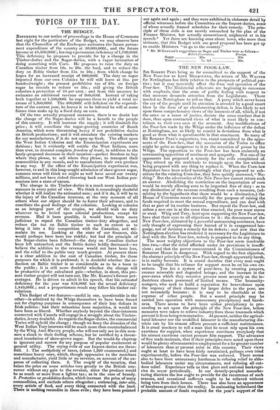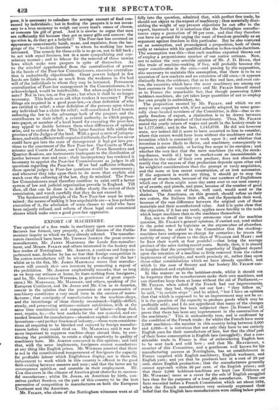THE NEW POOR-LAW.
SIR ROBERT PEEL being as far committed to the support of the New Poor-law as Lord MELBOURNE, the return of Mr. WALTER for Nottingham has little relation to the prospects of political par- ties ; but it may materially affect the form and operation of the Poor-law. The Ministerial adherents are beginning to announce with emphasis, that the state of public feeling with respect to • that measure demands attention from the Legislature. There needed no Nottingham to tell us that. A party which never hears the cry of the people until its attention is arrested by a good smart blow in the form of an electioneering defeat, is less likely to act upon those comprehensive views of the interests of all, which, if not the same as a sense of justice, dictate the same conduct that it does, than upon contracted views of what is most likely to con- tribute to their own ease at the moment. Any modifications of the Poor-law made by the Whigs under the influence of the defeat at Nottingham, arc as likely to consist in deviations from what is good as from what is questionable in that enactment. So many of Sir ROBERT PEEL'S supporters, too, stand committed to the oppo- nents of the Poor-law, that the accession of the Tories to office might be quite as dangerous to it as the retention of power by the Whigs. The opposition to the Poor-law has been eminently an unreasoning opposition of sentiment and sympathy. Not one of its opponents has proposed a remedy for the evils complained of. They stirred up the multitude to trample upon the law without being prepared with any thing to replace it. When the Corn-law Repealers have been asked tauntingly what they proposed to sub- stitute for the existing Corn-law, they have quietly answered," No- thing." But the adversaries of the New Poor-law cannot return such an answer. Abolishing the restriction on the importation of corn would be merely allowing corn to be imported free of duty : as to any diminution of the revenue resulting from such a measure, (ad- mitting by the hypothesis that there would be a diminution,) the House of Commons meets annually for the purpose of raising the funds required to meet the annual expenditure, and can deal with that as part of its routine business. But repeal the Poor-law, and unless a new one is at the same time enacted, the poor must starve or steal. Whig and Tory, bent upon supporting the New Poor-law, have shut their eyes to all objections to it : the denouncers of the New Poor-law, animated by a powerful unreasoning sentiment, have only thought of expressing their hatred of it in exaggerated lan- guage, not of devising a remedy for its defects : and now that the Nottingham election has rendered it necessary for the Legislature to deal with the New Poor-law, nobody is prepared to do any thing. The most weighty objections to the Poor-law seem resolvable into two,—that the relief afforded under its provisions is insuffi- cient; and that the power concentrated in the Commissioners of Somerset House is dangerous. With regard to the first objection, the abstract principle of the New Poor-law, though apparently harsh, is in reality humane. It is sound doctrine that every man ought to be taught that his reliance for support must be on his own ex- ertions. Too lax a system of poor-laws, by creating paupers, creates miserable and degraded beings ; and the increase in the poor-rates which they occasion presses most severely on the in- dustrious classes possessed of limited means. The humanity.. mongers, who seek to build a reputation for benevolence upon the urgency of their clamour for larger doles to the poor, are not necessarily humane : it is easy to be charitable at the expense of other people. But a sound principle may be carried into operation with unnecessary precipitancy and harsh- ness. There seems to have been undue precipitancy in pro- ceeding to act upon the principle of the New Poor-law, before measures were taken to relieve industry from those trammels which prevent it from being remunerative. At present, neither the agricul- tural labourer nor the unskilled labourer in the manufacturing dis- tricts can by his utmost efforts procure a sufficient maintenance. It is cruel mockery to tell a man that he must rely upon his own exertions for support, when experience convinces everybody that his utmost exertions cannot procure him support. The advocates of free trade maintain, that if their principles were acted upon there would be plenty of remunerative employment for a far greater number of labourers than at present exist in this country. Their views ought at least to have been fairly scrutinized, perhaps even tried experimentally, before the Poor-law was enforced. There seems also to have been unnecessary harshness in refusing relief to able- bodied labourers under any circumstances, and refusing all out- door relief. Experience tells us that gluts and national bankrupt- cies do occur periodically. In our densely-peopled manufac- turing districts the law ought to provide for the recurrence of such seasons, and occasional sufferers ought to be relieved without being torn from their homes. There has also been an appearance of harshness greater than the reality. In estimating beforehand the probable amount of funds required for the year's support of the poor, it is necessary to calculate the average amount of food con- sumed by individuals ; but in feeding the paupers it is not neces- sary to a true economy to weigh out every man's ounce of cheese, or measure his gill of gruel. And it is unwise to argue that men are sufficiently fed because they get so many gills and ounces: the question is, do they get a bellyful? The Poor-law has assumed an appearance unnecessarily harsh, mean, and repulsive, from the lan- guage of the "bookish theorists" to whom its working has been intrusted. The remedy for these evils is to go on, not to fall back ; to act with equal firmness, but in a more sympathizing and con- solatory manner ; and to labour for the removal of those unwise laws which make men paupers in spite of themselves. As to the mischief apprehended from the centralization of power in the hands of the Poor-law Commissioners, excessive centraliza- tion is undoubtedly objectionable. Great powers lodged in few hands are liable to abuse, as much from the weakness as the bad will of the individuals to whom they may be intrusted. Permanent centralization of Poor-law management in the Commissioners, it is acknowledged, would be indefensible. But when ought it to termi- nate? Not in two, ten, or five years; but when it shall be no longer necessary. This leads us to ask what renders it necessary ? Four things are required in a good poor-law,—a clear definition of who are entitled to relief; a clear definition of the persons upon whom any individual has a claim for relief; well-constituted local boards enforcing the law to the advantage both of the paupers and the contributors to their relief; a central authority, to which pauper, rate-payer, or member of a local board for executing the poor-law, may appeal to decide between them when differences of opinion arise, and to enforce the law. This latter function falls within the province of the Judges of the land. With a good system of jurispru- dence, and with sufficient well-organized tribunals, the Poor-law never could have got into the state of derangement it had got into_pre- vious to the enactment of the New Poor-law. Our Courts at West- minster and Courts of Assize, our Courts of Town Recorders and Quarter-Sessions, are instruments inadequate to the distribution of justice between man and man : their incompetency has rendered it necessary to appoint the Poor-law Commissioners as judges in all questions regarding the Poor-law. If we had sufficient tribunals, these special judges in Poor-law questions would be unnecessary ; and whenever they take upon them to do more than explain and watch over the enforcing of the law, they do mischief The Poor- law Commissioners must therefore continue to exist until a better system of law and judicial organization prevails in England. Till then, all that can be done is to define clearly the extent of their commission, and watch carefully that they do not exceed it.
The fundamental principle of the New Poor-law must be main- tained: the means of making it less unpalatable are—a less pedantic execution of it, the admission of some classes to relief who have been unjustly refused, and reform of those legal and economical abuses which make even a good poor-law oppressive.



























 Previous page
Previous page